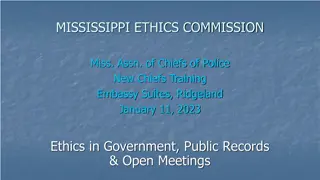Challenges and Inequalities in Mississippi at the Turn of the 20th Century
Challenges faced by Mississippians at the dawn of the 20th century include populist efforts for betterment, adoption of laws promoting segregation and lynching, societal masks worn by Black Mississippians, demographic disparities, Jim Crow laws, and the neglect of education due to a weak economy and racism.
Download Presentation

Please find below an Image/Link to download the presentation.
The content on the website is provided AS IS for your information and personal use only. It may not be sold, licensed, or shared on other websites without obtaining consent from the author.If you encounter any issues during the download, it is possible that the publisher has removed the file from their server.
You are allowed to download the files provided on this website for personal or commercial use, subject to the condition that they are used lawfully. All files are the property of their respective owners.
The content on the website is provided AS IS for your information and personal use only. It may not be sold, licensed, or shared on other websites without obtaining consent from the author.
E N D
Presentation Transcript
The dawn of the 20th Century
POPULISTS TRIED TO USE STATE GOVERNMENT TO BETTER THEIR CONSTITUENTS LIVES.
The adoption of the 1890 constitution, the white ruling class used its power to protect it s own interest. The state began creating new laws for segregation ( separation of the races) legal segregation started in 1888 when a law passed that segregated passengers on trains. Violations of this rigid cast system ( social order) often sparked violent punishment or LYNCHING, that is mob murder by hanging, shooting , or burning. that is mob murder by hanging, shooting , or burning. Between 1889-1945 Mississippians lynched 476 people-24 of these people were white. 14 were black females and the rest were black males. Mississippi had more lynchings than any other state. LYNCHING,
Black Mississippians developed a mask to wear for white society. Outwardly Black Mississippians would be polite and respond with yes sir and no sir. There was one social self for whites and a real self only shared with other blacks Black Mississippians never doubted their self- worth. Often they accepted separation from whites and focused their efforts on black economic development.
IN 1900, THE POPULATION OF MISSISSIPPI WAS 1,551,270, AND OF THAT NUMBER, 58% PERCENT WERE BLACK.
Jim Crow Laws were attempts by the state and local governments to restrict the freedoms of African Americans SEPARATE CAR LAW---was a law that created equal but separate railroad cars for blacks and whites.
A weak economy and racism caused MS to neglected the education of it s children. There was no public education system in the state prior to Reconstruction Teachers were not educated. White teachers were paid $130 a year. Black Teachers were paid $90 a year. 75% of all teachers studied in the rural schools were they taught. Educational opportunities varied by counties. A portion of the school funding came from paying the $2 poll tax. Poll tax was used to keep poor whites and blacks from voting.
After 1885, the ruling white Democrats reduced education funding to levels that threatened even basic teaching. The majority of children were black , and the democrats refused to spend much on their education
After Civil War credit was tight. CREDIT the ability to buy something now and pay for it later Farmers did not have $ to pay workers wages. Poor Farmers did not have $ to buy land As a result Poor White Farmers and Freedmen turned to Sharecropping and for most, life was miserable A sharecropper did NOT own the land, the house he/she lived in, or the tools they used. They rented and worked the land and paid rent in the form of a portion of the yearly crop. In 1890 60% of all farm families were sharecroppers
In 1907 one third of the the larger plantations plantations in mississ. Mississippi held blac ner black workers in near slavery. pg 160
Life was miserable, lived in board shacks put in the middle of fields Poor diets, consisting of cornbread, salt pork, and molasses Didn t plant vegetables Because the landowner said it was a waste of time Children went to school for about 6 weeks, the rest they were working in the fields Most land owners only let the sharecroppers grow cotton Once cotton fell after Civil War few sharecroppers made money
Needed more planters because they were still clearing land for farming Planters had experienced with Chinese during Reconstruction Chinese escaped the fields and opened stores catered to blacks 1900s, Delta planters recruited Italian immigrants for workers Worked hard, and planted vegetables as well as cotton Refused the to allow the planters to sell their crops, so they could make more money Wouldn t buy items at inflated prices As a result planters charged Italian workers more for ginning fees, and increased the cost of everything from transportation to medical supplies
Italian laborers failed Planters found that they couldn t treat them as they did the poor white and black sharecroppers Sharecropping only worked if planters could continue to control their tenants both blacks and whites By 1910, sharecroppers in the Delta had lost most of their independence
BOLL WEEVIL: Beetle that attacks cotton before it s fibers open. Devastated the crops for several years Farmers in the SW portion of the state started farming tung trees, dairy coms and tomatoes. The Boll Weevil is still a pest today.
1880-1930 White pine forest throughout the state were clear cut ( cut down all trees) The area known as the Piney Woods Cities such as Hattiesburg, Laurel and Moss Point developed because of the Timber Industry. Companies did not replant, just took their profits and moved on.
PAGE 164 ITS YOUR TURN
Many Mississippians hoped that the Constitution of 1890 would give them a whites only democracy Mississippi had never been a democracy Before the war planters had ran the government During Reconstruction The Republicans kept former Confederates out of state governments only briefly After 1875 the black majority was denied the right to vote by either force or fraud, and a small group of insiders controlled the government Some white leaders wanted to reform the political party Fear of losing control to the3 black majority required a strong Democratic Party
After CW Federal Govt was controlled by Republicans. They favored business over farmers. Passed higher taxes on manufactured goods. Farmers suffered because nation was on gold standard instead of Silver. Silver was more plentiful. Money was scarce cost of borrowing was high.
Farmers in Mississippi suffered from falling cotton prices, and high tariffs Republicans favored businessmen over farmers, and passed high tariffs on manufactured goods Because of these high tariffs farmers had to pay high prices for American- made products Farmers also suffered because the country was on the gold standard Money was backed by gold Because gold was scarce, money was scarce Farmers needed cheap money because they had to borrow so much to purchase supplies and equipment Farmers wanted the dollar to be backed by silver, which was more abundant than gold
Farmers needed cheap $ to buy equipment and supplies. Wanted $ backed by silver Issue caused nationwide Political Revolt MS Farmers Alliance. Was organized to help small farmers challenged the most powerful insiders. (James George) 1891: MS Farmers Alliance endorsed Ethelbert Barksdale Editor of Jackson Newspaper/George was elected
1891 Populist Party was formed to help small farmers Demanded Tariff reform Graduated income tax Regulation of Railroad The use of silver to back money Election of Senators instead of appointment The election of 1891 The Democrats used the race issue, saying that the populist wanted to give blacks political rights and thus defeated the populist.
Anselm J. McLaurin emerged as the leader of the Democratic Party in the late 1890s serving as Governor and U.S. senator Built his power on patronage (appointing people to government positions as rewards for political support), and his ability to pardon criminals His goal was to get and keep political office In speeches he appealed to small farmers, but did little to help them Across the state, one person dominated each county s Democratic organization Corruption was expected Very easy for political bosses to control the conventions Even where conventions voted for nominees, fraud was very common Campaigns were seen as entertainment
Widespread political corruption and fraud lead to the adoption of the primary method of choosing candidates In a primary all of the party s members vote for the candidates of their choice 1899 A.H. Longino was elected governor, and proved to be a good governor Began campaigns to attract industry to Mississippi Oversaw the design and construction for a new Capitol Destroyed the old political system by accepting the statewide primary
After financial scandals in 1900, more pressure to do away with the convention nominating system increased In response, the Delta dominated Democratic executive committee agreed to hold county primaries Refused to allow voters to choose a new executive committee James K. Vardaman, editor of the Greenwood Commonwealth, lead dissatisfied Democrats Representatives from 29 counties held another convention, appointed a new state executive committee, and nominate a slate of electors and delegates who favored the primary Their slate won the next county primaries despite opposition and fraud in the Delta counties
1902 Governor Longino asked legislature to pass a primary law Under pressure from the public and newspaper opinion legislature agreed The new whites only primary completely eliminated any role for blacks Democratic Party allowed only whites to vote, the few blacks lost any influence they had The Democratic nominee always won the November general election because the Republican and Populist parties offered very little opposition
1903 James K. Vardaman was elected Governor. He represented the poor whites of the Hills and Piney Woods. His blend of white populism and racism appealed to the poor whites in the state. Grew up in Yalobusha county, where he studied law, and worked as a newspaper editor, he tried planting but failed Was a volunteer during the Spanish American War(1898) and saw service in CubaHe didn t like big money, and complained loudly about banks and railroads abusing small farmers Favored government ownership of the railroads Was former governor of MS and Champion of Poor Whites
James K. Vardamans ideas weren t new He was a showoff Grew his hair to his soldiers and wore white suites and large hats While campaigning he rode in a wagon pulled by several pair of oxen Earned the nickname Great White Chief He was elected governor
Governor Vardaman asked legislature to end funding for black schools Legislature ignored him so he turned to other issues Under the convict lease system, state hired out prisoners to individuals that were supposed to feed and clothe them, but Often, prisoners received no food, clothes, or medical care Some contractors worked prisoners to death then leased out more. Vardaman s actions ended the lease system and improved prison conditions
Vardaman would have been called a progressive in a different society and minus his racist views Members of the progressive movement believed that government was best equipped to correct ills of society, they wanted to increase the governments involvement in social issues Vardaman proposed laws to restrict child labor, assist the deaf, and care for mentally ill, but they were not passed He was successful in getting increased funding for schools and teachers He created a state textbook commission which ended schoolchildren having to pay inflated prices for their books He protected consumers by regulating railroad, insurance, and utility companies He vetoed a law that allowed corporations to own large amounts of land because he favored breaking up the big plantations and distributing the land among small farmers Overall, he looked out for the interests of poor whites who had elected him.
Vardaman found it impossible to help poor whites without also improving life for the blacks Most of the prisoners who benefited from his reforms were black Most of the consumers who paid lower prices were black Vardaman called out the national guard to stop the lynching of black prisoners
When Senator McLaurin died in 1909, the legislature had to choose someone to complete his term. Vardaman ran against Leroy Percy Percy believed that Vardaman s racism and populism were dangerous. He was determined to prevent Vardaman s election The legislature decided that the vote for senator would be taken in a secret caucus for Democrats. Voting lasted six weeks Both sides reportedly offered legislators government jobs, money, and liquor. Percy won by five votes, and Vardaman charged the election had been stolen from him A grand jury was called to investigate this secret causcus
Theodore Bilbo ran for the office of lieutenant governor and supported Vardaman in his bid for the U.S. Senate The poor had found their savior in Vardaman, but Bilbo was one of them Bilbo s speeches were crude and passionate, he was a master of insults and mistrusted anyone educated, sophisticated, or refined 1911 elections brought class divisions among white voters Vardaman and Bilbo won the election and from the senate seat Vardaman was able to control the legislature and the Democratic party Bilbo was a State Senator and Lieutenant Governor of Mississippi
Bilbos term as lieutenant governor was covered in scandal Man of the People Took bribes, his character was attacked by conservatives He ran for governor and won in 1915 Worked with legislature to create a state tax commission, to equalize property tax assessments throughout the tax, established a board of bank examiners, to build a highway commission and develop a pardons board Founded a tuberculosis hospital , and a charity hospital, and a training school for delinquents Passed a school attendance law and an anti-lobby law. Lobbyist-a person paid to represent the interests of a company or special group. Under Bilbo education received the largest appropriation in history School funders were equally distributed, and adult night classes began
1914 War broke out in Europe between the Central Powers (Germany, and Austria-Hungary), and the Allied Powers (France, Great Britain, and Russia) The United States was drawn into the war in 1917 Most Mississippians supported the war 6000 men served in Europe, selective service act of 1917 2 army camps were built in the U.S. Camp Shelby and West Point America s participation in the war was brief (war ended in 1919) The most dramatic change in Mississippi politics was it ended the political career of James Vardaman
Vardaman voted against America entering the war, he blamed big businesses for the war For his vote he was branded unpatriotic This was the end of Vardaman s political career WOODROW WILSON WAS PRESITDENT OF THE UNITED STATES DURING WORLD WAR 1























